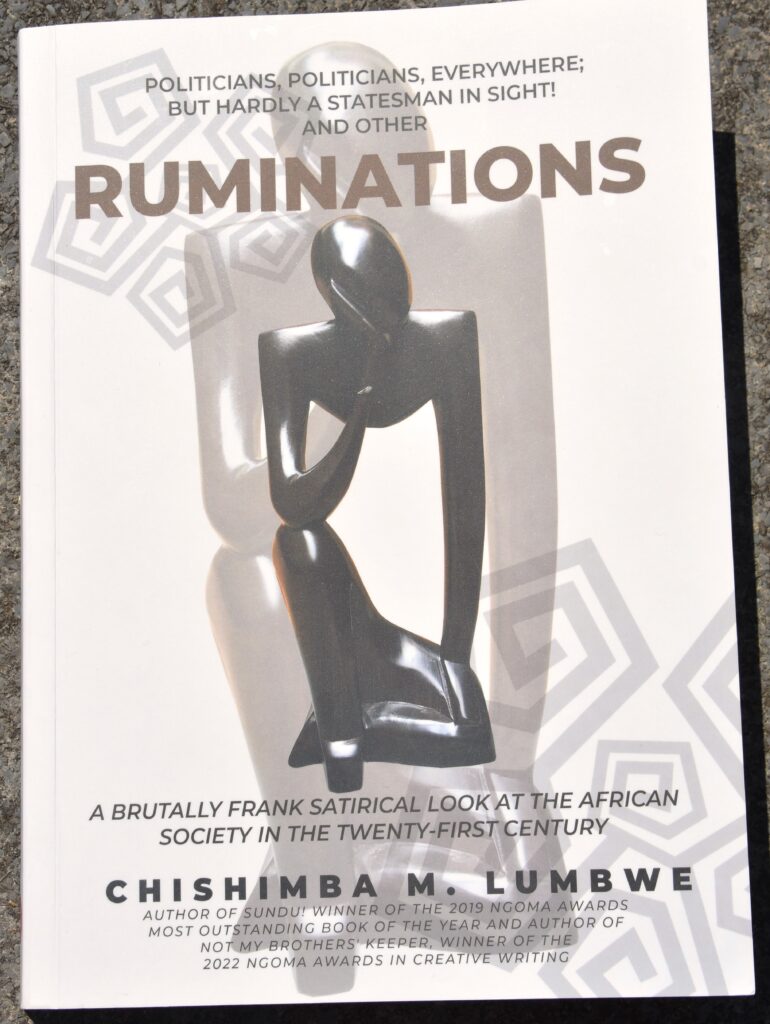Book Review
by
Mwizenge S. Tembo, Ph. D
Emeritus Professor of Sociology
Chishimba M. Lumbwe, Ruminations: Politicians, Politicians, Everywhere; But Hardly a Statesman in Sight! A Brutally Frank Satirical Look at the African Society in the 21st Century, Lusaka, Pensulo Publishers, 2022, 266 pages, Paperback, $14.82 (K300.00)
Introduction
In the past fifty-nine years since 24th October 1964 when Zambia got its independence from British colonialism, we Zambians have had seven Presidents. We should not only be proud of this outstanding achievement against all the obstacles, but we have had peaceful transfers of power from one president to the next. The first President who is the founder of our peaceful nation was President Kaunda who had led the nation for the first 27 years of independence.

After yet another general election year in 2021, for the seventh time power was transferred from the outgoing President Lungu of the Patriotic Front (PF) political party to the incoming President Hichilema of the United Party for National Development (UPND) at a public ceremony at Heroes Stadium. During these 59 years, there has been the rise and fall of political parties, candidates, and presidents. Millions of Zambians of several generations have participated in election campaigns and have voted. Presidents have proposed and implemented development plans, have made numerous cabinet appointments including ambassadors. The question which may be the biggest elephant in the room is “what is the uniquely Zambian or African political culture that has evolved in our country over the last 59 years?”
Ruminations
Dr. Chishimba Lumbwe is a medical doctor who was a State House physician for three presidents. He worked closely in the top corridors of Zambian political power for more than forty years. He has written a book titled: “Ruminations: Politicians, Politicians, Everywhere; But Hardly a Statesman in Sight! Satirical Look at the Zambian/African Society in the 21st Century.”
Ruminations are when a person has many deep thoughts about a specific problem. The problem might be their marriage, job, family, why a relative died in the family, why they did not get a particular job. Ruminations are associated with negative thoughts as the ruminator is trying to understand may be an existing or past problem. Dr. Chishimba Lumbwe in this book has been ruminating about Zambian and African politics since 2015 but with a twist; he is ruminating using satire or while being funny. He tries to make the reader laugh about our Zambian or African politicians and our political system since we inherited it from our British colonial Westminster parliamentary system in 1964.
Instead of using the conventional chapters in the book, Dr. Chishimba Lumbwe uses 12 Ruminations. The 12 ruminations include: Rumination 1 – Blood is Thicker Than Water, But Not Thicker Than Opaque Beer; Rumination 2 — Politicians, Politicians, Everywhere; But Hardly a Statesman in Sight! Rumination 6 — Why Politicians Always Think It’s Always Their Time to Eat; Rumination 8 — What Happens When A Political Party Tastes The Heady Pill of Power; Rumination 11 — Job Description for the President of Zambia.
In his book, Ruminations, Dr. Chishimba Lumbwe who was at one time a State House Physician, provides us Zambians and African citizens and readers a valuable gift. This is because if you are Zambian/African who has lived in Zambia for an extended period during the last 59 years, the book will make you smile, laugh, but also think about our past and future lives both as individuals and as a nation. He alludes to the role of cadres and cadrerism in Zambian political party politics and government. The book also provides some powerful creative expression including some poetry on pages 19, 20 and 152. The book also has many examples of providing wisdom, unique insights, and observations in virtually all the 12 ruminations.
For example, discussing how the President and other top political leaders fill job positions, Lumbwe says: “Let’s get a bit personal and put you, the reader, in the president’s shoes: Be honest. Who would you trust to keep your skeletons firmly locked inside a steel cupboard?……And in any case, if you do not fill up some of those posts with your relatives, someone else will fill them up with their relative…..That’s just the way the logic runs, unless you have a true statesman in the State House.” Rumination 1, page 21.
In Rumination 6 under Theorem 10: Lumbwe says there are more men who are psychopaths than women, this is why our politics are so terrible, page 115; If you are interested in understanding how charts, graphs and mathematics are related to human politics, Rumination 10 with thrill you. In Rumination 12 Lumbwe asks why there are so many political parties in Zambia; Lastly in the Postlude Lumbwe asks, “Should we constantly blame other people for our collective stupidity?” p. 176. In the Postlude, Lumbwe discusses “18 things that do not make sense about the Zambian society specifically and the African society in general.” Pp. 216-244.
I would highly recommend Ruminations not just for the ordinary Zambian/African reader, but also for politicians, scholars of political philosophy, social studies teachers, lecturers, Zambian/African English literature, mathematicians, and professors of political science and satire in colleges and 17 Zambian universities including UNZA and other universities in Africa and abroad.
There is the mistaken impression and reputation that one can only learn from books published about Zambia and Africa by political science experts in London, Paris, New York, and Tokyo. The perspective and epistemology Lumbwe expresses is always regarded as illegitimate. Ruminations is a legitimate social perspective and epistemology by a Zambian about the challenges of the Zambian/African political systems and experiences that may be different from politics particularly in Europe or Western societies to whom we always compare ourselves.